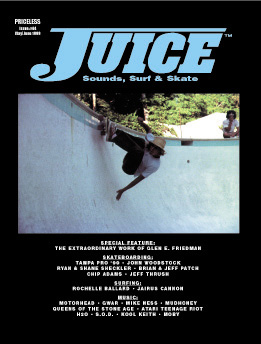

Issue #44
May/June 1999
JUICE Sounds, Surf & Skate
SPECIAL FEATURE
THE EXTRAORDINARY WORK AND OPINIONS OF GLEN E.
FRIEDMAN
interview by Greg Edge, Andy Kessler & Jim Murphy
A Black Flag show boils over into a riot; Jay Adams knocks coping blocks loose with a frontside grind; Public Enemy stands with the S1Ws. Pivotal moments in radical culture. Somehow, Glen E. Friedman was always there at the crucial moment when things went down; the images he captured are a visual history of our evolution. A published photographer for SkateBoarder magazine at age 14, Friedman had roots in both L.A. and NYC, and this bi-coastal perspective gave him the opportunity to be at the forefront of both cities? exploding scenes. Get your hands on his books Fuck You Heroes, Fuck You Too and The Idealist for some amazing photography and history, then go out and document your own scene.
What drives you to want to take a photo?
It's kind of hard to describe. it's just what you like.
You know when you hear it; you feel it when you see it.
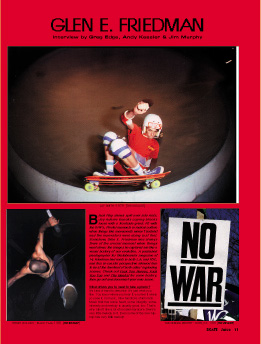
What are you listening to now?
Fugazi, the Make-Up, this new band Asian Dub Foundation
is kinda cool, they're from England, some Pakistani kids. There are
different rap records out there I like, a lot of singles I hear on the
radio that are pretty cool. Unfortunately, everyone is spreading
themselves so thin in hip-hop. They make one or two good records, and
the rest are just filler. That kid Ja Rule sounds pretty cool. I
actually shot some photos of him recently; we'll see what happens. I
like that band Bark Market a lot. I don't even know what he's talking
about, but I like the sound of it. System of a Down is some pretty
radical new shit. Mostly, I listen to old records. I'm not an old fart,
but I just like really good, great records and you can't beat the
classics. In my opinion, I'd love to hear new records that blow them
out of the water. Unfortunately, I don't.. So I'm still listening to
late '70's/early '80's punk rock, The Stooges and early hip hop.
So it's not all politics with your music?
No, it's definitely not politics. If I shoot, it's more
political, but for my personal enjoyment, it's not all politics. If
there are bad or stupid politics on a record, I generally won't like
it, but if it's offensive politics or something that's just hard core,
like on some hip-hop records, sometimes it's entertaining and I can
deal with it. I don't think it's a good thing to promote, but some of
it sounds cool. I love The Godfather movies. I love some gangster
movies, so why shouldn?t I like some gangster rap? it's intriguing.
it's interesting, but I don't necessarily want to help promote those
aspects anymore. I think people got the message being put out in the
late '80s and early '90s and anything past that is overkill. I express
my politics through my photography every day. I called up Jerry Brown?s
campaign and offered to let them use some of my photos of him when he
was running for president. There are political messages in a lot of my
photos; a lot of the bands I photograph have political messages. In The
Idealist, there are some political images that have nothing to do with
bands. They?re landscapes I shot in Hiroshima and in South Central LA.
Those are very political images.
How do you feel about film use and veganism?
I definitely consider myself a vegan and I am absolutely
100% conscious that there's gelatin in film. I have probably gone a lot
farther than anyone else has in that, I would have to say. Maybe I'm an
artist first. No, actually, I'm an inhabitant of the planet first and
an artist second. My main contribution to making the world more
interesting or even making it a better place is the way I take
photographs and share stories and expose people to different cultures.
To hopefully expand their minds. So that's the little sacrifice that
I'm making using film. I've gotten three continents on the same roll of
film. I've got pictures of Australia and Italy and the Beastie Boys
cover all on one roll, but, then again, I might shoot ten rolls a day
if I've got a really big job and I think they need a lot of images, but
I don't shoot that much film. I'm really careful; I take my time and
compose the images. I'm offended by the way people shoot film and
over-use equipment. it's kinda wack.
after greg talked to glen,murfandkesslermet up with Friedmanand here'swhat happened next. . .
Murf: You were there when it all started with pool
skating and the boys were innovating. What was it like being in the
scene when that went down?
When skateboarding was progressing in the'70s, there was
almost nothing to compare it to. In some ways, you could compare it to
punk rock back in '82 or hip hop in '87. But the creativity and the
attitude of skateboarders back then. . . it's hard to even explain, but
imagine what skateboarding would be like before anyone had ever done a
kickturn on vertical.
Murf: Yeah. Who did Tony Alva look to? Nobody.
Yeah, these people were innovators. They took stuff from
surfing moves, then things developed on flat ground and then they took
it to vertical walls. Like I explained in Fuck You Heroes, the first
day I saw Tony do a frontside air at the Dog Bowl I went back to school
the next day and tried to explain it to someone. They couldn't even
understand what I was talking about. It was just so out of the realm of
their reality of skateboarding. Then, when Alan Gelfand came around
four years later and did that Ollie air. . . How do you explain that to
someone? Now, that's the root of all skateboarding. I know people who
used to ride pools and do one wheelers barefoot with no grip tape..
it's shit you would say is suicidal now. The evolution of the sport is
just something you can barely explain. That's what was so beautiful. It
just kept on evolving every day. it's hard for me to get a younger
generation to even comprehend. And why do they even have the interest,
unless they're really curious about the history? A skater today could
just go out and do things his first day that we didn?t do for like five
years, but will he have style? Will he even know what style is? Will he
have any feel of the fluidity of cruising down a five-mile long hill
and know what it's like to carve? How can you call yourself a skater
without knowing how to carve? it's like being a surfer and not knowing
what it's like to get wet.
Murf: Hell, yeah.
Yeah, it's the root of the whole thing. If you skate by
yourself and it helps you express yourself and get rid of angst, it's
still the same thing. You just hate to see people become followers.
Skateboarders were leaders before. They did their own thing and had
their own style and had their own boards. Everyone used to make their
own board. You couldn't even consider yourself a skateboarder if you
hadn't made at least one of your own boards at home. Kids don't even
understand how we used to have to put eight ball bearings on each side
of the wheel and put the cones in. Putting a board together was an
all-night affair. Now you just buy bearings. Precision bearings were
probably the biggest jump there ever was after the urethane wheel.
That's something that kids today have no concept of. Once you were able
to get precision bearings, people were able to invent different types
of wheels and have them out on the market in weeks rather than years.
Later, all you had to do was pop out a wheel model and then throw in
the bearings. Back in the day at the old contests, if you broke a cone
or your truck fucked up or your bearings came out, you were fucked.
Skateboarding has definitely changed a lot but the original attitude is
still alive in a lot of kids who do their own thing. If they knew what
was involved, it would probably be the most interesting story they ever
heard. Especially for skaters because it's in their blood; for them not
to know is a travesty.
Murf: What do you think about all the new parks,
pools and bowls being built?
People say that parks killed skateboarding in one of its
phases but I think it's great that there are huge incredible places
built just for skateboarding, but, at the same time, who wants to pay
to skate? Who wants to be forced to wear safety equipment to ride? It
kinda of takes that original edge off. There?s just something inorganic
about having to pay and wear equipment if you don't want to.
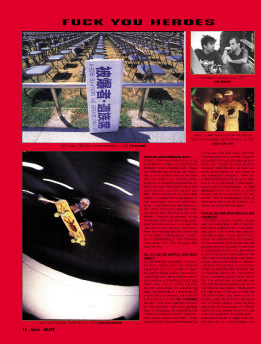
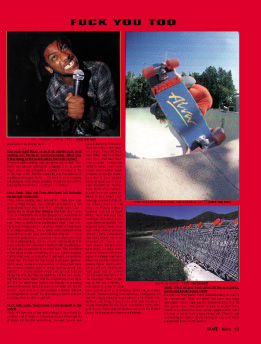
Andy: As far as all the skateboard magazines, are
there any you feel are really worthwhile?
I'd say that in almost every issue of a magazine,
there's at least one good shot. I'm not going to say that they all
suck, but overall they do. I look at Big Brother and Slap. Those are my
two favorites. There is some good stuff out there. I won?t say that
there isn?t, but it's far and few between.
Murf: I agree. Like in the beginning days of
SkateBoarder, people taking photos - like Cassimus and you - had a
quality in their photos you just don't see anymore.
Well, to play devil?s advocate or to just give the
younger guys a break, there was really only one magazine back then and
now there are at least six of them in the U.S. alone. Imagine if there
was only one right now. There were other ones that came and went during
the time of SkateBoarder, but none of them lasted more than a year and
the quality was far worse. But you had people from Surfer publications
putting that thing together who won awards and were really talented art
people. What Paul Haven used to do with the Craig Steyck DogTown
articles is fuckin? masterful. He influenced millions of kids all over
the world. If it wasn't for those articles, there may not even be
skaters today. I think DogTown is what really set the tone for the
whole success of and the whole rebel attitude of skateboarding.
Murf: Yeah, be as punk as you wanted to be.
Well, punk came after that. DogTown, I mean. The whole
punk rock aesthetic of skateboarding was always what people would call
punk later, but Tony Alva and Jay Adams were doing that stuff before
the Sex Pistols had even played their first song. It was being done in
England a couple of years later but it didn?t have the impact in
America yet. Once punk rock did get here and started to have an impact,
sure, it started influencing the style of people?s dress. But the
attitude wasn?t changed much. It was just the way people looked and the
music. People already had the attitude.
Andy: Your photos captured a specific time, one on
which people still reflect. Do you think as far as skateboarding goes
that you'll ever capture a period as groundbreaking again?
I don't think for skateboarding, because I'm not skating
every day like I did back then. There's a whole new crop of kids out
there. Why not let them portray it? As long as they really believe in
what they're doing and it's actually part of their own lifestyle and
they're not just some asshole out there shooting pictures because they
want to be published, then eventually they're going to get good
pictures. I like seeing a good picture; I can tell if the photographer
really digs the sport and he's really involved in it. You can feel it.
Taking pictures to me is something that's very special. I probably shot
Tony Hawk's very first published photo and he was really special then.
He was this incredible little stringbean of a kid. He was unbelievably
radical for his age and for his size and I knew he was going to be big
and famous and that he was going to have some technique. But just his
attitude and the way he rides and all that. Now, I'm so not interested
in shooting Tony Hawk, not only because he's an idiot to do the 'Milk
mustache' campaign, but because it's just not interesting to me. it's
cool to watch people do gnarly airs and stuff but I could hardly
imagine anything more boring than watching a half pipe. I don't care if
they're doing McTwist McNuggets. I don't give a shit. Those are tricks
for girls, like baton twirling, too much technical, not enough style.
I'm not saying if you did one of those crazy tricks ten feet out and
smashed your head, I wouldn't say that was radical, but I want to see
some shit with style.
Murf: If Duane was doing it, maybe.
No, Duane was. . . you know. The funny thing about Duane
is he had a lot of lines. He could do a lot of radical shit but his
style was completely sketch.. The reason he won contests and did so
well was the excitement of him literally looking like he was going to
eat shit and die, and then just pulling it off. He would get more
attention for doing an air one-foot out and hanging up the back truck
and still making it than someone who did a smooth stylish three-foot
backside air. Duane just took it to the edge of death-defying. The fact
that he did the loop was just sketchy. You never saw someone roll so
unevenly on a board as Duane. He was radical, but at the same time he
was so not smooth.
Murf: Was that because he was so fucked up?
Even sober he was that way. When he was drunk, you could
almost see it in his style. It was almost like those karate movies with
the drunken master. In a way, he's not really drunk. His style is just
sketch and I don't think he did it on purpose.
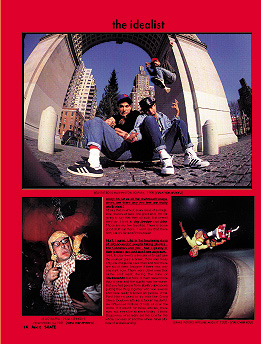
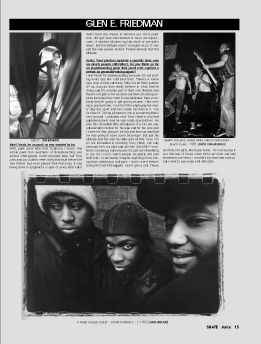
Murf: And Jay was super smooth?
Skateboarding to Jay was like walking down the sidewalk
to anybody else. He would walk down vertical walls like people would
walk down the street. What kids today would do on a curb if they were
aggressive radical skaters, Jay would do on a vertical wall in a pool
and fall just as much. He would break a board every day he rode and he
didn't give a shit. You look at the old magazines and you see the
influence they had and you realize that he really had almost no
sponsors for more than a couple months at a time. He never made a lotof
money off it; he just skated and couldn't be bothered with all that
shit, even when his dad owned the company. He would put stickers on his
board to make extra money for photo sessions, but he was just radical.
He was the most radical skateboarder of all time. Tony is the
all-around greatest; Jay is the all-around most radical.
Andy: Tell me what it means to have style?
Style in skateboarding is just like style in everything
else. You just know it when you see it, but the main thing is it's
natural. it's like when you pour water into a glass from a pitcher, it
just has a flow; it just runs a certain way. Nothing interrupts that
flow; it all just moves around itself. It just goes in and out and over
the ice cubes. That's basically where style comes from, the path of
least resistance. Someone who rides so effortlessly you can't tell that
what they're doing is even difficult and they look COOL.
Andy: What was it like hanging out with all the boys
from DogTown?
Well, when I was hanging out with them, they gave me
shit all the time. I would hang out in the schoolyard because everyone
hung out, but to hang out to the extent that I did, I probably wasn't
that cool. It was probably because I was taking good photos. I would
get invited to the parties and hang out with them, but I was younger
than everyone else, so for me to be in that crowd, it was pretty tough.
I would definitely take a beating sometimes, but overall it was a good
crew. They looked out for me, too, and because I was hanging out with
them, they were getting more coverage in the magazines. I mean, Tony
Alva is the most important pro skateboarder of all time, but if you
look at Skateboarder magazine in '77 after the original Dogtown
articles came out, he wasn't getting coverage until I started getting
him back in the magazine again. With his skating and my photos, they
just couldn't deny getting him back in. They almost boycotted him
basically because he was friendly with guys from other magazines. I
looked up to Tony and the way he skated, and he was cool with me. He
used to give me free equipment and I used to sell boards for him at
school. I got that shot at the Dog Bowl and, bam, he was a star again.
The thing was, I was there when shit was going down all the time. I
wasn't just coming in once a month and taking pictures because it was
an assignment, I was there all the time because that's what I did; that
was my life everyday. We would get out of school and go try and find a
pool, and we would all hang out on the weekends and go skating. It was
my lifestyle, my life and I think that's why the photos speak to people
the way they do, because it wasn't fake. It was as real as it gets.
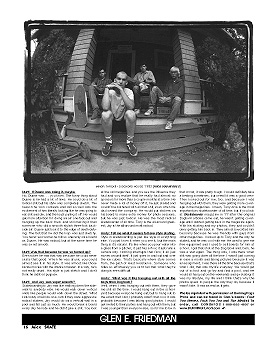
Photos reprinted with permission of Burning Flags Press and can be found in Glen's books: Fuck You Heroes, Fuck You Too and The Idealist. To order, call CONSAFOS 1-800-655-4897 or www.burningflags.com